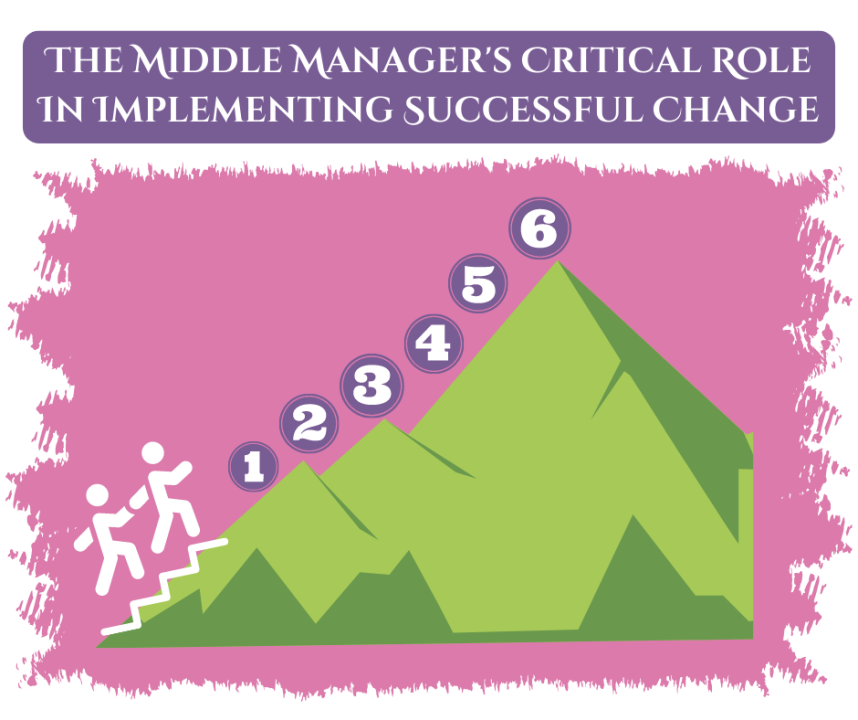The Critical Role Of Middle Managers In Organizational Effectiveness

Table of Contents
Middle Managers as the Bridge Between Leadership and Employees
Middle managers act as a vital link, communicating strategic goals from upper management to frontline employees and vice-versa. They are the crucial conduit, ensuring that the overall vision is understood and implemented effectively at every level. This two-way communication is paramount for organizational success. They translate complex directives into clear, understandable tasks, ensuring alignment and minimizing confusion. Without this crucial translation layer, strategic initiatives can falter and employee morale can suffer.
-
Effective communication strategies: Middle managers must master various communication techniques, adapting their approach based on the audience and message. This includes written communication (emails, reports), verbal communication (meetings, one-on-ones), and visual communication (charts, presentations).
-
Active listening skills: Truly understanding employee concerns and feedback is essential. Active listening goes beyond simply hearing; it involves paying attention, asking clarifying questions, and showing empathy.
-
Feedback mechanisms: Establishing regular feedback loops—both upward and downward—is vital. This ensures that communication flows smoothly and that issues are addressed promptly. This could involve regular team meetings, performance reviews, and open-door policies.
-
Transparency in communication: Open and honest communication builds trust. Middle managers should strive to be transparent about company goals, challenges, and changes, fostering a sense of shared purpose and reducing uncertainty.
Driving Employee Engagement and Motivation
Middle managers are directly responsible for fostering a positive work environment and motivating their teams. Their leadership style directly impacts employee morale, productivity, and retention. Highly engaged employees are more productive, innovative, and committed to the organization's success. This makes the role of middle managers in employee engagement absolutely critical.
-
Recognizing and rewarding achievements: Acknowledging and celebrating both individual and team accomplishments boosts morale and reinforces positive behavior. This can include verbal praise, bonuses, promotions, or public recognition.
-
Providing regular feedback and coaching: Constructive feedback is essential for employee growth and development. Regular coaching sessions provide opportunities for improvement and demonstrate a manager's investment in their team's success.
-
Creating opportunities for professional development: Investing in employee training and development shows a commitment to their growth within the organization. This can involve providing access to courses, workshops, mentoring programs, or opportunities for advancement.
-
Fostering a culture of collaboration and teamwork: Building a strong team requires creating an environment where collaboration and teamwork are valued and encouraged. This could involve team-building activities, cross-functional projects, and open communication channels.
-
Addressing employee concerns promptly and fairly: Responding promptly and fairly to employee concerns shows respect and builds trust. This involves active listening, investigating issues thoroughly, and taking appropriate action.
Improving Operational Efficiency and Productivity
Middle managers are responsible for optimizing processes and resource allocation within their departments. They are the frontline implementers of strategic initiatives, ensuring that day-to-day operations run smoothly and efficiently. Their ability to identify and resolve bottlenecks directly impacts the bottom line.
-
Process improvement and optimization: Middle managers should continuously analyze processes to identify areas for improvement. This could involve streamlining workflows, automating tasks, or eliminating redundant steps.
-
Resource allocation and management: Effective resource allocation is crucial for maximizing productivity. Middle managers need to ensure that resources (time, budget, personnel) are used efficiently and effectively.
-
Performance monitoring and evaluation: Regularly monitoring key performance indicators (KPIs) helps identify areas of strength and weakness. This allows for timely interventions and adjustments to improve overall performance.
-
Problem-solving and conflict resolution: Middle managers often act as mediators, resolving conflicts and finding solutions to operational challenges. Their ability to address issues quickly and effectively minimizes disruptions and maintains productivity.
-
Implementing new technologies and strategies: Middle managers play a crucial role in adopting and implementing new technologies and strategies to improve efficiency and productivity. This requires staying up-to-date on industry trends and adapting to change.
Developing Future Leaders and Talent
Middle managers play a significant role in identifying, mentoring, and developing future leaders within the organization. They are often the first line of management to observe and assess employee potential. Nurturing talent is a key responsibility for building a strong and sustainable organization.
-
Identifying high-potential employees: Middle managers are well-positioned to identify employees with leadership potential based on their performance, skills, and attitude.
-
Providing mentorship and coaching: Mentoring and coaching help employees develop their skills and build confidence. This guidance is essential for developing future leaders.
-
Delegating responsibilities and empowering employees: Delegating tasks and empowering employees allows them to gain experience and develop their skills. This is a key aspect of leadership development.
-
Creating a culture of learning and development: Fostering a culture of continuous learning and development encourages employees to grow and improve their skills.
Conclusion
In conclusion, the role of middle managers in achieving organizational effectiveness cannot be overstated. Their ability to bridge the gap between leadership and employees, drive engagement and productivity, and nurture future talent is essential for sustained success. Investing in the development and support of middle managers is a critical investment in the overall health and performance of any organization. By fostering strong middle management, organizations can unlock significant potential and achieve their strategic goals. Strengthen your organization by focusing on the development and empowerment of your middle managers today. Invest in your middle management and reap the rewards of a more productive and engaged workforce. Effective middle manager training and development programs are key to unlocking this potential.

Featured Posts
-
 Bread Price Fixing Scandal 500 Million Settlement Hearing Scheduled For May
Apr 22, 2025
Bread Price Fixing Scandal 500 Million Settlement Hearing Scheduled For May
Apr 22, 2025 -
 Trumps Trade Wars A Challenge To Americas Financial Primacy
Apr 22, 2025
Trumps Trade Wars A Challenge To Americas Financial Primacy
Apr 22, 2025 -
 The Future Of Family Planning Otc Birth Control In A Post Roe World
Apr 22, 2025
The Future Of Family Planning Otc Birth Control In A Post Roe World
Apr 22, 2025 -
 The Papal Conclave A Test Of Pope Franciss Reform Efforts
Apr 22, 2025
The Papal Conclave A Test Of Pope Franciss Reform Efforts
Apr 22, 2025 -
 The Pan Nordic Military Concept Assessing Swedish Tank Divisions And Finnish Infantry
Apr 22, 2025
The Pan Nordic Military Concept Assessing Swedish Tank Divisions And Finnish Infantry
Apr 22, 2025
